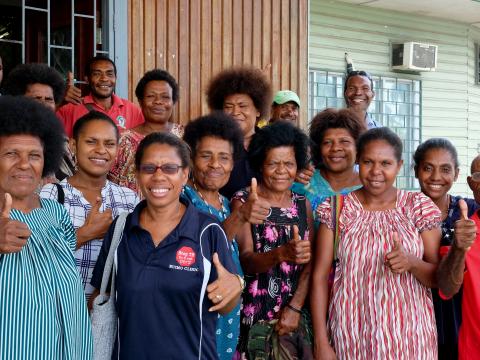Strengthening tuberculosis care at a community level

In Papua New Guinea, around 20 percent of people undergoing tuberculosis treatment do not finish their medication because of weak support from health facilities and communities. Interrupted treatment can lead to drug resistance and more people falling ill with TB.
Due to an extreme shortage of health staff and community volunteers, PNG faces many challenges in providing directly observed treatment (DOT) to TB patients. DOT is the World Health Organization’s recommended strategy for curing TB. It requires a trained health worker or volunteer to give the prescribed TB drugs and watch while the patient swallows every dose.
With assistance from World Vision PNG under the Global Fund Grant, the National Tuberculosis Program (NTP) is spearheading the establishment of a community-led support group for people undergoing treatment in two high TB burden provinces, namely Madang and Morobe.
“Helping someone be cured of TB brings me happiness, that’s why I’ve been doing it for nine years now,” says Clement Harrau, Chair of TB treatment supporters from Butibam Clinic. “But communities need to know more about how to fight the disease. We hope to receive more support so we could visit communities to do awareness activities,” he said.
The initiative aims to ensure that all diagnosed TB patients are assigned a treatment supporter who will provide the daily DOT support for six months. This would entail active participation of the patient’s local level government (LLG) councillor who will serve as link between health facility and community. When there is a new TB patient, the health facility will alert the LLG councillor who will, in turn, inform other leaders from settlements, villages, churches, and community-based organisation to identify a suitable treatment supporter for the patient.
“A lot of times I have to use my own money so that I can get results from the laboratory. When TB patients come, we don’t want to fail them, we do what we can,” said Miriam Key, nurse manager of Buimo clinic. “We also struggle to raise funds for our volunteers so we could give them bus fare and food vouchers. Support from LLG would go a long way in helping our volunteers do their role in supporting TB patients,” she said.
In February, representatives from NTP and World Vision met with around 20 TB treatment supporters and health facility staff from two clinics in Morobe to discuss the pilot initiative, which was well supported by all participants. During the meeting, participants expressed the need for transportation and communications support for volunteers. Health facility staff emphasised the need for incentives to motivate volunteers to continue and improve their work. A meeting with LLG councillors to discuss the pilot initiative is set for March in Morobe and Madang.
Under the Global Fund Grant, NTP and World Vision will provide enabling support to volunteers and health facility staff through funding for transportation and communications. As a sustainability measure, NTP and World Vision will push for LLG to provide incentives and other forms of support for volunteers.